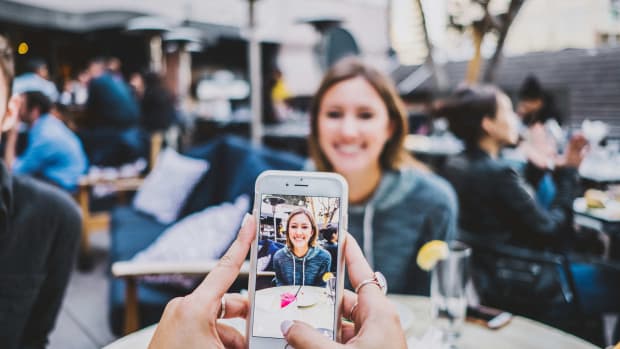
Happier without social media? “Depends on what you do with your time”
TikTok, Instagram, Snapchat and WhatsApp: students spend more time on these platforms than they would like. Would a life without social media make them happier? “Quitting social media does not automatically mean you will spend more time with friends.”
Young people spend an average of 6.5 hours a day on their phones. A large part of that time is spent on social media: WhatsApp and Snapchat, and especially endless rows of TikTok videos or Instagram stories.
“I realise that I’m quite addicted,” says media and culture student Catho Gruters (21). “When I have a busy study period, I find myself seeking distraction. Sometimes I can spend the whole morning scrolling.”
To “get more out of her day”, she regularly deletes the apps. “I’m more productive then, and I can concentrate better on reading books and watching films. But I can never manage to live without the apps for more than a few months.”

Social media detox
There are initiatives, such as Mei Social Vrij, that encourage a social media detox. Everyone can imagine that this makes you more productive. But does such a detox period also lead to greater happiness in life? A recent review of the literature suggests not: in general, a social media detox has no effect on life satisfaction. In addition, young people like Catho often don’t stick to the detox, quickly falling back into old patterns, says UvA researcher Amber van der Wal, who studies social media and young people.
And there are certainly advantages to social media. “You’re in contact with people from all over the world,” says Business Administration student Zofia Swislowsa (19). “And it’s also very entertaining. I’m aware of the disadvantages it can have for your mental health, but I don’t suffer from that myself.”
Nevertheless, a period without social media may well be beneficial for some people, says Laura Lemahieu, PhD candidate at the University of Antwerp. “Think of people with depression, anxiety disorders or ADHD, who feel that their lives are negatively affected by social media. Or students who suffer from Fear of Missing Out (FOMO) or feel that media controls their lives in some way. No research has been done on the latter group yet, so that remains speculative.”
Growing up without social media
Little is known scientifically about the effects of a longer social media break on well-being. Floor Portein (21), a student of English language and culture, grew up without social media, except for WhatsApp. “I installed Instagram in my first year of secondary school, but I was a rather nervous teenager and got stressed when I received a message. So I deleted it again.”
Growing up without Instagram has made her a different person, Portein believes. “As a result, I was less concerned with my appearance and the perfect image that Instagram presents. That took away some insecurity.”
Did it make her happier? “On the one hand, yes, because I wasn’t aware of the ‘trends’ of the time. On the other hand, it also isolated me from my peers, which in hindsight may have made me less happy.” Now that she is a bit older, Portein also sees the advantages of social media: that people sometimes maintain social contacts through Instagram or use the app to see how people they knew in the past are doing. “Now I sometimes consider installing the apps after all.”
More time for work, cooking and cleaning
According to Portein, the idea that without social media you don’t use your phone is not true. “I don’t have social media now, but I still watch a lot of series on my phone.” This is also what scientific research shows. The promise of a “social media detox” is based on the assumption that when people stop using social media, they will devote more time to activities that are “more valuable”, such as spending time with friends, reading a book or mastering a new hobby. This assumption is described in science by the “time displacement hypothesis”.
And that hypothesis turns out to be incorrect, says American communication scientist Jeffrey Hall. In an experimental study, he demonstrated that people who do not use social media do not necessarily do things that make them happier. Hall put 136 people between the ages of 18 and 68 (40 per cent of whom were students) on a social media diet and asked them to keep a diary. From this, he concluded that people who no longer use social media simply spent more time surfing the internet, working, cooking and cleaning. Activities that, like social media, had a negative or neutral effect on their well-being. But then again, they did have a cleaner house.
And what happens if you do intend to do something “valuable” with your time? Science does not yet have an answer to that, says Van der Wal. “What I can say is that many young people indicate that they want to have more control over their social media use.” That is why Van der Wal is looking for ways for young people to regain control over their time without having to stop using social media. “Whether that will also lead them to consciously spend time on other ‘valuable’ activities is something we hope to be able to answer in the near future with our research.”


